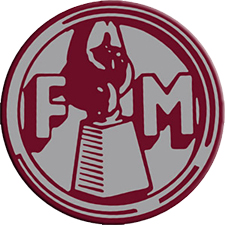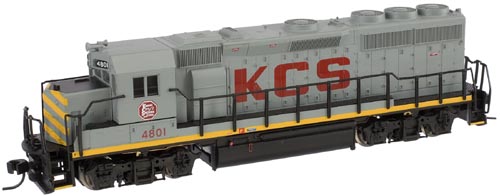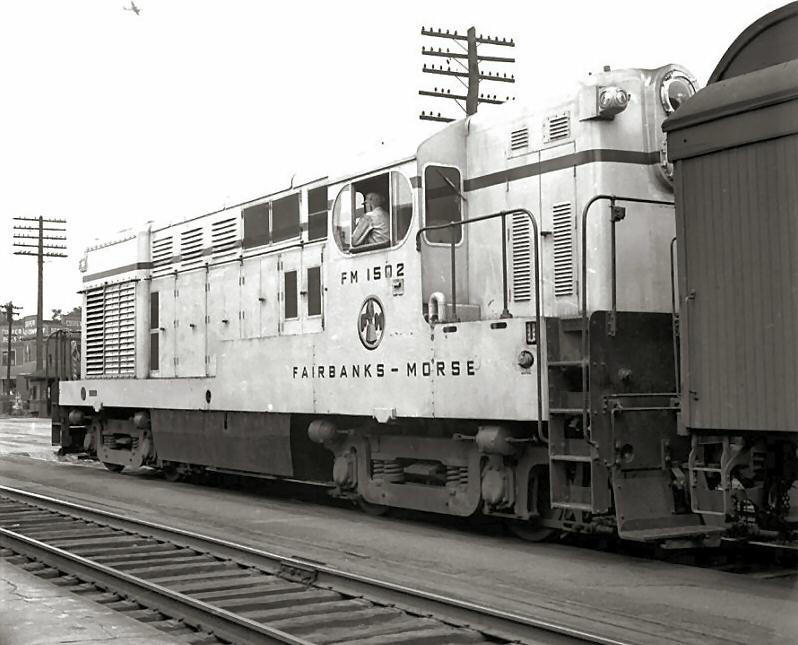Model Information: Atlas introduced the Fairbanks-Morse H15-44 and H16-44 models in 2003. These two body styles share the same internal mechanism. The models are standard high-quality modern mechanisms featuring split-frames, dual flywheels, and magnetic operating knuckle couplers.
They have typical high-end smooth and quiet running and can pull the expected 30+ cars on a flat surface.
DCC Information: These models are DCC-Friendly and accept drop-in decoders such as the Digitrax DN163A0.
The DCC install requires some work, because of the reversible green/red classification lights, that will not come with the above replacement drop-in decoder. For this reason, these models are decidedly DCC-Friendly rather than DCC-Ready. In our opinion, it is worth the extra $ to buy a decoder-equipped version (with a NCE decoder) rather than do it yourself unless you are very comfortable with a soldering iron. Brad Myers has an excellent guide (NScaleStations Blog) on how to do it if you are feeling brave.
The DCC install requires some work, because of the reversible green/red classification lights, that will not come with the above replacement drop-in decoder. For this reason, these models are decidedly DCC-Friendly rather than DCC-Ready. In our opinion, it is worth the extra $ to buy a decoder-equipped version (with a NCE decoder) rather than do it yourself unless you are very comfortable with a soldering iron. Brad Myers has an excellent guide (NScaleStations Blog) on how to do it if you are feeling brave.
Prototype History: The FM H-15-44 was a road switcher manufactured by Fairbanks-Morse from September 1947 to June 1950. The locomotive was powered by a 1,500-horsepower (1,100 kW), eight-cylinder opposed piston engine as its prime mover, and was configured in a B-B wheel arrangement mounted atop a pair of two-axle AAR Type-B road trucks with all axles powered. The H-15-44 featured an offset cab design that provided space for an optional steam generator in the short hood, making the model versatile enough to work in passenger service as well as freight duty.
Raymond Loewy heavily influenced the look of the unit, which emphasized sloping lines and accented such features as the radiator shutters and headlight mounting, as is found on CNJR #1501 and KCS #40. The cab-side window assembly incorporated "half moon"-shaped inoperable panes which resulted in an overall oblong shape. The platform (underframe) was shared with F-M's 2,000-horsepower (1,500 kW) end cab road switcher, the FM H-20-44, as was the carbody to some extent. The platform and carbody was also utilized by the H-15-44's successor, the FM H-16-44.
Only 35 units were built for American railroads and none exist today.
From Wikipedia
Read more on American-Rails.com
Full F-M H-15-44 data sheet on The Diesel Shop.
Raymond Loewy heavily influenced the look of the unit, which emphasized sloping lines and accented such features as the radiator shutters and headlight mounting, as is found on CNJR #1501 and KCS #40. The cab-side window assembly incorporated "half moon"-shaped inoperable panes which resulted in an overall oblong shape. The platform (underframe) was shared with F-M's 2,000-horsepower (1,500 kW) end cab road switcher, the FM H-20-44, as was the carbody to some extent. The platform and carbody was also utilized by the H-15-44's successor, the FM H-16-44.
Only 35 units were built for American railroads and none exist today.
From Wikipedia
Read more on American-Rails.com
Full F-M H-15-44 data sheet on The Diesel Shop.
Road Name History: The ACY finished their 10 mile line between Mogadore and Akron, Ohio in 1912. In 1920 a big opportunity presented itself as New York Central began selling off a number of subsidiaries to avoid running afoul of anti-trust laws. One of these subsidiaries the Lake Erie & Western had controlled the Northern Ohio Railway which ran from Akron to Delphos, Ohio. The NO was leased to ACY, even though it was 16 times the size of the ACY. They operated under the ACY flag and in 1944 the two merged. They never did reach Canton or Youngstown. The ACY was best known for serving the tire and rubber industry in the Akron area. Passenger service was a bit of an afterthought with the last mixed train operating in 1951.
The heaviest power in the steam fleet were USRA light Mikados, at least one of which was equipped with a tender booster. Their diesel fleet (about 18 locomotives give or take) was a bit odd. Their switchers were all Alco and their road power was all Fairbanks Morse. The FMs were setup to run long hood forward. In 1964, the AC&Y was purchased by the Norfolk & Western as part of the N&W-NKP-Wabash-P&WV-AC&Y consolidation. Unlike the other roads, the N&W kept the AC&Y as a separate operation.
By 1970, all of AC&Y's Alcos and FMs had worn out and had been traded in to EMD. However, they were traded in for new locomotives for AC&Y's parent, Norfolk & Western. N&W then leased older power (mostly ex-Nickel Plate GP-9s) to AC&Y. At that point, the only way to tell you were seeing an AC&Y train was "Leased to AC&Y" painted in small letters below the road number on N&W geeps. Finally, the AC&Y was merged into the Norfolk & Western in 1982 in preparation for the Norfolk Southern merger.
The heaviest power in the steam fleet were USRA light Mikados, at least one of which was equipped with a tender booster. Their diesel fleet (about 18 locomotives give or take) was a bit odd. Their switchers were all Alco and their road power was all Fairbanks Morse. The FMs were setup to run long hood forward. In 1964, the AC&Y was purchased by the Norfolk & Western as part of the N&W-NKP-Wabash-P&WV-AC&Y consolidation. Unlike the other roads, the N&W kept the AC&Y as a separate operation.
By 1970, all of AC&Y's Alcos and FMs had worn out and had been traded in to EMD. However, they were traded in for new locomotives for AC&Y's parent, Norfolk & Western. N&W then leased older power (mostly ex-Nickel Plate GP-9s) to AC&Y. At that point, the only way to tell you were seeing an AC&Y train was "Leased to AC&Y" painted in small letters below the road number on N&W geeps. Finally, the AC&Y was merged into the Norfolk & Western in 1982 in preparation for the Norfolk Southern merger.
Brand/Importer Information: In 1924 Stephan Schaffan, Sr. founded the Atlas Tool Company in Newark, New Jersey. In 1933 his son, Stephan Schaffan, Jr., came to work for his father at the age of sixteen. Steve Jr. built model airplanes as a hobby and frequented a local hobby shop. Being an enterprising young man, he would often ask the owner if there was anything he could do to earn some extra spending money. Tired of listening to his requests, the hobby-store owner threw some model railroad track parts his way and said, "Here, see if you can improve on this".
In those days, railroad modelers had to assemble and build everything from scratch. Steve Jr. created a "switch kit" which sold so well, that the entire family worked on them in the basement at night, while doing business as usual in the machine shop during the day.
Subsequently, Steve Jr. engineered the stapling of rail to fiber track, along with inventing the first practical rail joiner and pre-assembled turnouts and flexible track. All of these products, and more, helped to popularize model railroading and assisted in the creation of a mass-market hobby. The budding entrepreneur quickly outgrew the limitations of a basement and small garage operation. Realizing they could actually make a living selling track and related products, Steve and his father had the first factory built in Hillside, New Jersey at 413 Florence Avenue in 1947. On September 30, 1949, the Atlas Tool Company was officially incorporated as a New Jersey company.
In 1985, Steve was honored posthumously for his inventions by the Model Railroad Industry Association and was inducted into the Model Railroad Industry Hall of Fame in Baltimore, Maryland. In addition, Steve was nominated and entered into the National Model Railroad Association Pioneers of Model Railroading in 1995.
In the early 1990s, the Atlas Tool Company changed its name to Atlas Model Railroad Company, Inc.
In those days, railroad modelers had to assemble and build everything from scratch. Steve Jr. created a "switch kit" which sold so well, that the entire family worked on them in the basement at night, while doing business as usual in the machine shop during the day.
Subsequently, Steve Jr. engineered the stapling of rail to fiber track, along with inventing the first practical rail joiner and pre-assembled turnouts and flexible track. All of these products, and more, helped to popularize model railroading and assisted in the creation of a mass-market hobby. The budding entrepreneur quickly outgrew the limitations of a basement and small garage operation. Realizing they could actually make a living selling track and related products, Steve and his father had the first factory built in Hillside, New Jersey at 413 Florence Avenue in 1947. On September 30, 1949, the Atlas Tool Company was officially incorporated as a New Jersey company.
In 1985, Steve was honored posthumously for his inventions by the Model Railroad Industry Association and was inducted into the Model Railroad Industry Hall of Fame in Baltimore, Maryland. In addition, Steve was nominated and entered into the National Model Railroad Association Pioneers of Model Railroading in 1995.
In the early 1990s, the Atlas Tool Company changed its name to Atlas Model Railroad Company, Inc.
Item created by: Steve German on 2016-04-24 23:38:13. Last edited by George on 2024-01-26 20:28:57
If you see errors or missing data in this entry, please feel free to log in and edit it. Anyone with a Gmail account can log in instantly.
If you see errors or missing data in this entry, please feel free to log in and edit it. Anyone with a Gmail account can log in instantly.











